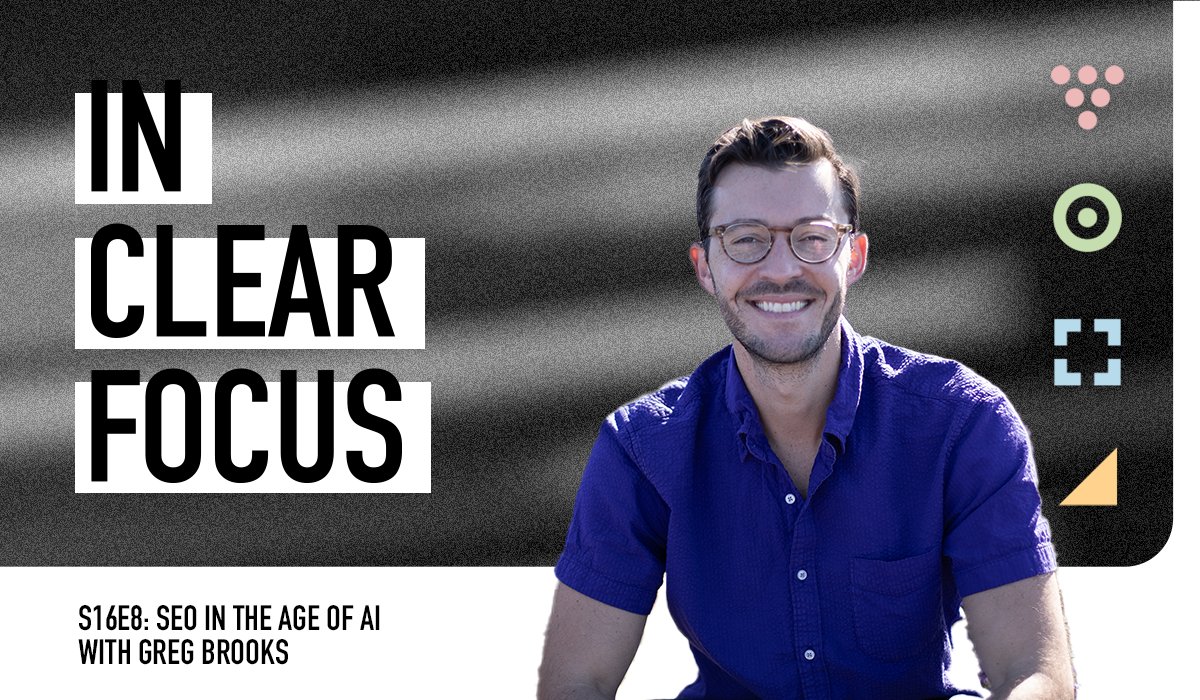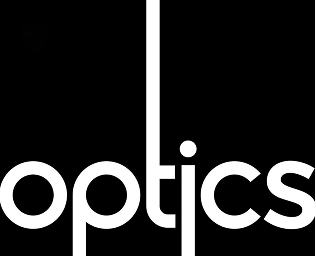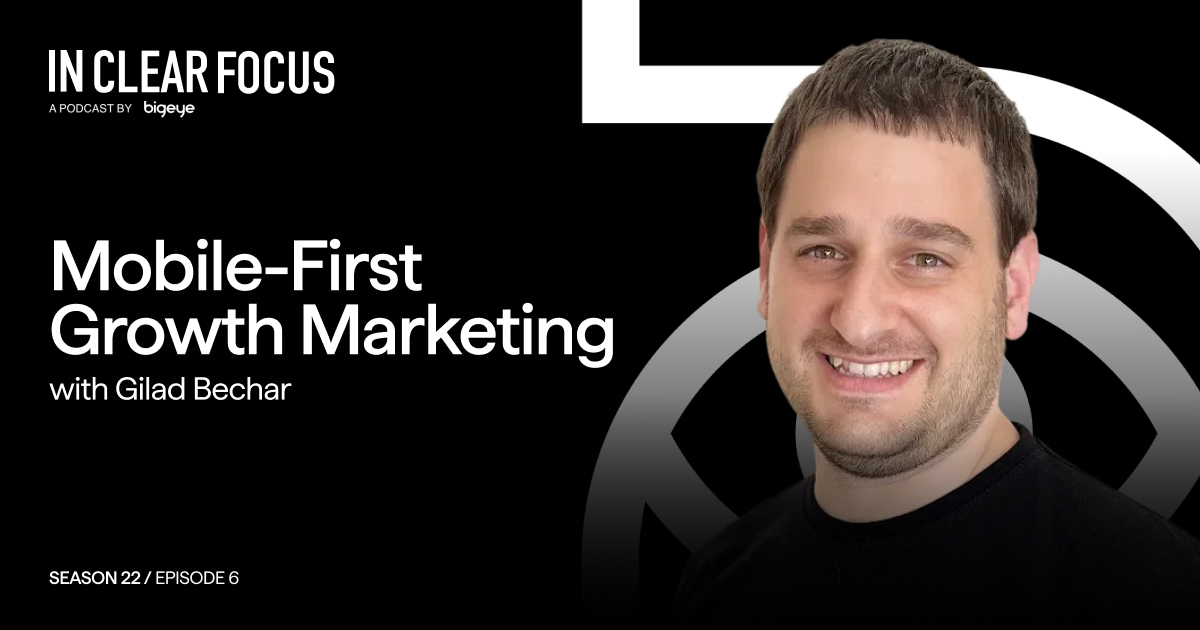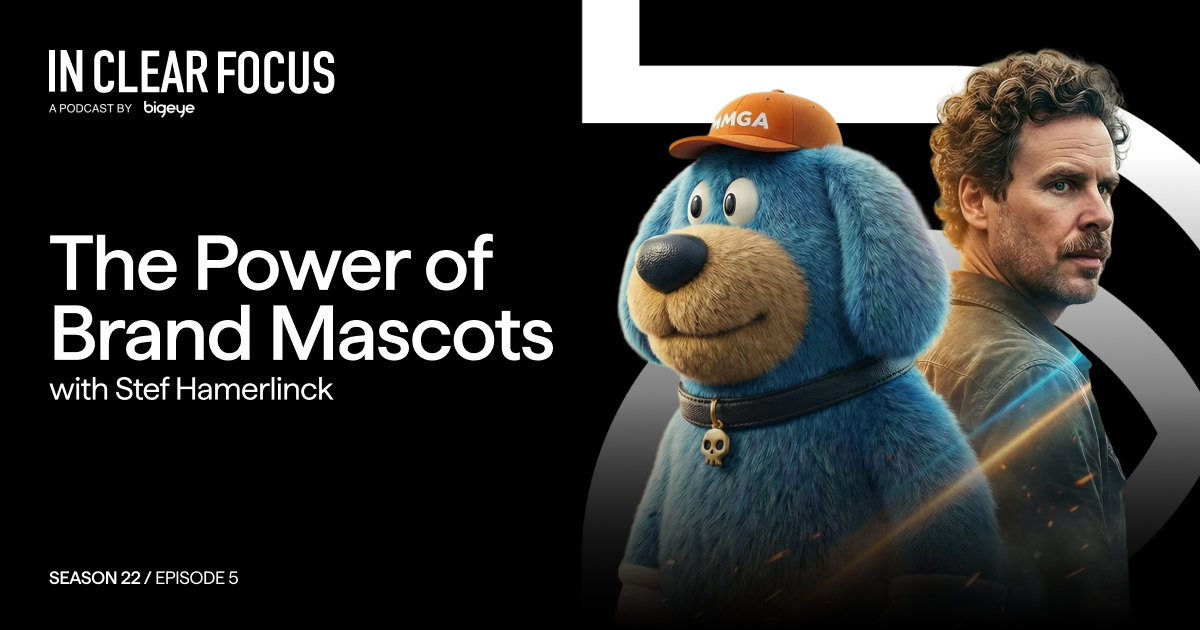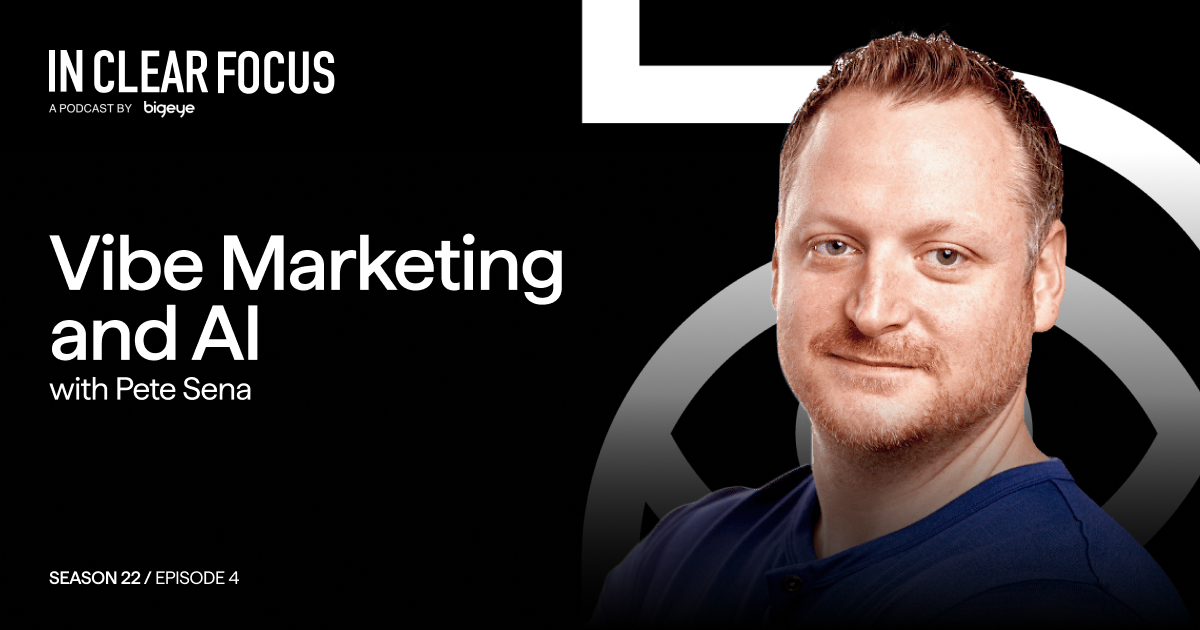IN CLEAR FOCUS: Greg Brooks, CMO at SearchTides, explores SEO’s future in the AI era. He discusses evolving strategies, AI’s impact on content and search, and the importance of expert-driven material. We examine e-commerce SEO challenges, social search trends, and the rise of AI-powered small firms. Greg also offers fresh insights on adapting to algorithm changes and using AI to stay competitive. This episode provides key perspectives beyond SEO for marketers in today’s digital landscape.
Episode Transcript
Adrian Tennant: Coming up in this episode of IN CLEAR FOCUS
Greg Brooks: What is going to exist, and how do you participate and win, and stay competitive in a world where literally 99.9 percent of all of the content on the internet is going to be AI-generated? And that’s both written as well as video!
Adrian Tennant: You’re listening to IN CLEAR FOCUS, fresh perspectives on marketing and advertising, produced weekly by Bigeye, a strategy-led, full-service creative agency growing brands for clients globally. Hello, I’m your host, Adrian Tennant, Chief Strategy Officer. Thank you for joining us. Search Engine Optimization, or SEO, is well established as a critical component of successful B2C and B2B digital marketing strategies. However, with the rise of artificial intelligence and constant changes to search algorithms, the field of SEO is undergoing significant transformation. As marketers, it can be challenging to remain up-to-date, let alone to get ahead of all the changes. Our guest today is at the forefront of these developments in SEO and AI. Greg Brooks is a partner and the CMO at SearchTides, shaping the future of effective SEO by leveraging large language models and navigating the AI-driven era of the internet. Greg and his team have decoded Google’s algorithms, quantifying them into thousands of ranking factors and empowering SearchTides to provide organizations with a competitive advantage, creating strategies that drive traffic and unlock new revenue streams. Greg has collaborated with brands such as Home Depot, Zillow, Western Union, and FanDuel, among many others. As you’ll hear, Greg’s expertise in AI and search offers a fresh perspective on the evolving digital marketing landscape. To discuss the future of SEO in the age of AI, I’m delighted that Greg is joining us today from Austin, Texas. Greg, welcome to IN CLEAR FOCUS!
Greg Brooks: Thanks so much for having me on, Adrian. I’m excited to chat about really how the landscape of AI is changing search and it’s changing the fabric of how we work and how we service the world. So it’s really fascinating.
Adrian Tennant: Greg, could you start by telling us a bit about your background and how you came to be in your current role as partner and CMO at SearchTides?
Greg Brooks: Yeah, absolutely. So I actually started off my career, which I’m putting with quotes in it, as a professional poker player for that, for that reason. And I was very math-focused, but it was very behavioral-focused. It was very games. I always liked video games as I was younger also. And the transition into kind of the agency world and then at SearchTides, was really about trying to play a game also. And with SEO specifically, it was trying to get to the top of the board and beating everybody else who was also trying to get to the top of the board. And I think that allowed me to take just kind of like a fun, lighthearted lens to what we were doing. And we’ve transformed that at SearchTides through years of research and development of staying ahead of trends and of really making at the time would appear to be bold predictions about what the future of the industry is going to look like, and being right about enough of them where we feel comfortable with our understanding of what the future is going to look like today. So I think it’s been, for me, a personal journey. And then for SearchTides itself, I know firsthand it’s been really about the standard of excellence being maintained for over a decade.
Adrian Tennant: Can you give us an overview of what SearchTides does and who some of your clients are?
Greg Brooks: Yeah, absolutely. We’ve worked with a lot of clients. We’ve worked with Western Union. We worked with FanDuel. We’ve worked with Home Depot. We’ve worked with, you know, various Fortune 500s. In terms of what SearchTides does specifically, we’ve historically been a hub for all things search and SEO. And that has been a focal point on how do people discover information online. And we’ve seen that change in transitions throughout the years, and we’re seeing that go through a very large change in transition today as well.
Adrian Tennant: I’ve noticed that you have a lot of educational content on the SearchTides website, and you’ve written that AI will enable marketers to create good digital content at zero cost. Yeah. So Greg, can you elaborate on what this means for SEO and content creation in general?
Greg Brooks: Sure. And I’ll take it one step further, Adrian, I’ll say for the internet, you know, what is it like going to exist and how do you participate and win and stay competitive in a world where literally 99.9% of all of the content on the internet is going to be AI-generated? And that’s both written as well as video. So that’s the big question that we’ve looked at and tried to solve that SearchTides. And the way that we’ve done that is by putting together a framework for kind of the eras of the internet. The past era, especially in search, was really foundational. So that was the classic building blocks. In search terms, you would say that was link building, that was on-site optimization, that was page titles, all that sort of stuff. The current era that we’re in, we’re calling it the influence era, and that’s more about expertise, authoritativeness, trustworthiness. And the next era, ironically, we’re calling the human era of both search and the internet, which is what does that look like when almost none of the content is actually created by human beings?
Adrian Tennant: We’re going to need to take a moment to just absorb all of that. And of course, I’m talking as someone who did their searching on AltaVista back in the day. So it’s come a long way.
Greg Brooks: Yeah, as it has. Yeah, former Ask Jeeves person here myself.
Adrian Tennant: Well, let’s break this down and start with discussing social search. Today, how important is discoverability on platforms like TikTok and Instagram, especially when thinking about CPG brands?
Greg Brooks: In the past, maybe five or 10 years ago, Google really, as a discovery platform for information, was the place to go. When you wanted to look something up on the internet, that’s where you went. And from that point, we’ve had this transition where that is still very much the case in a variety of capacities. And for a lot of people, that’s still exactly the same thing. and it will continue to be. Beyond that, you now have attention being pulled towards the phone, being pulled within a lot of social media platforms, and almost by habit, combined with the technological advances of different algorithms and AI, now you have a lot of folks who are just staying on a platform that they’re native to. So for some people, that’s Facebook. For some people, it’s Instagram. For some people, it’s TikTok. For some people, it’s YouTube. For some people, it’s Pinterest. And they’re looking to discover and search for knowledge on those platforms themselves. And so it happens in two ways. The first is passive. I scroll through my feed, or I get recommended a video from YouTube, and that’s a passive action happening. I’m just given that from the website. And then there’s active, which is I’m actively searching on those websites. Different demographics have different preferences. Obviously, younger folks are going to be on TikTok and people who are more wedded to their habits are going to stay on the platforms like Google, where their habits are more likely to take place or where they’ve been more established. So being on these platforms for brands becomes critical because it’s actually more about meeting your customers where they are actively searching for information already. For some, that’s going to be only Google. For many, that’s not going to just be one place. I think the best rule of thumb that we have is whenever we are working at, you know, our business organizations, vendor as a vendor or client, whatever it is, we kind of like forget how we actually purchase and interact with the internet as consumers. We’re all over the place as consumers. We’re checking things out on different websites, on different social media platforms. We’re talking to different people. We’re looking at reviews. We’re reading different pieces of content, watching different videos. Then all of a sudden, when we put ourselves in the opposite shoes as the company or the organization, we’re just like, “Yeah, everyone is going to wake up waiting to see what I have to say to them and can’t wait to interact with it.” And we just like forget that’s not how it works. Let’s remind ourselves that. When we search for things online, it’s oftentimes not in one location because we’re going through a discovery process of knowledge and we’re going through the purchasing cycle of awareness, consideration, and purchase. Where we go for that information is very often going to be different at each step of that process. And how we’re validating that information is very often going to be different at each step of the process. flip it as a brand. Therefore, you should be in those different areas at those different steps of the process. Therefore, you should have an understanding of what the bias of behavior is for your customers and be more weighted towards being where your customers are or how they specifically look for information and understanding that’s not true for somebody else’s customers. So you just have to have more flexibility in how you participate and someone’s journey of acquiring knowledge, which is what search is at the fundamental level.
Adrian Tennant: Greg, can you discuss the unique challenges and opportunities in e-commerce SEO for CPG brands?
Greg Brooks: I think that what a lot of people get wrong in search is going for traditional topics and keywords. So for example, I have a specific pair of snow boots. Let’s just say I’m a website. I sell snow boots are the best. A lot of folks try to target like “snow boots” or “black snow boots.” And then they go, “No, okay, well, that’s too crowded. Let me get more specific. Cold weather snow boots.” And they’re still in this product-oriented game where they’re literally going to compete. So what’s an e-commerce website structure looks like at the bottom? It’s product. And then the layer above that, it’s category. And so every e-commerce company is competing on the category level. Every single snow boots company in the world is competing on the snow boots company. So you’re probably not winning there. And then on the product side of things, if you have a non-generic name, someone has to be searching for your specific product already for them to find it. So it’s probably going to be a branded search. So there’s not that much value there. And if you don’t have a specific product name, then you have the same problem that you deal with categories. You’re basically competing against every other giant e-commerce brand that also has a generic name for a black t-shirt. So that’s typically where most e-commerce SEO strategy lives, where it really should live is going one step further along the creative line and basically being like, “Okay, what are the must-haves for a trip to Iceland? What are the must-haves for somebody who likes to climb mountains?” And now you’re getting into categories where you’re going to create a more general piece of content and some of your products will be the must-haves within that category, but they’re going to have typically larger search volumes, they’re going to have typically way lower competition, So, you know, maybe in this example, you’re not just a snow boots company, maybe you’re like a winter gear company. Now, all of your products have become the eight solutions that are must-have in an article for someone who’s planning a specific trip. Now you’re just trying to rank for that trip. And that typically is going to be a way more conversion-oriented and better ROI focus.
Adrian Tennant: Relatedly, you’ve written too about the importance of experience and expertise in content creation. How can marketers ensure their content stands out?
Greg Brooks: Oh, that’s such a good question. We, right now on ChatGPT, you know, 4.0, we can create OK content with the click of a button. It’s not really good. It’s like mediocre. But for a lot of people, it raised the level beyond what they could create on their own. So it’s a losing strategy to just use that and create content with it. But what is it going to look like when it’s ChatGPT 10.0 or 15.0? Like there will come a time where a model is so good that it can actually create an aggregated piece of content in the same way that you can get an answer to your question today with the same level of like, “Wow, this is actually really good.” So that will happen again, both for written as well as for video. So what do you do as a person? The answer is you lean into the human component. So an LLM or an automated content creator is an aggregator of information. It does not have experience. It does not have expertise. It has a regurgitation of facts. It’s a more effective version of Wikipedia. Can I go to Wikipedia to learn? Yeah, totally. Can I go to Wikipedia to draw on some person’s experience as it’s being described to me on a Wikipedia page? No. That’s where the opportunity is for us because Google messed up. They incentivized people to create encyclopedia pages. And now we have a machine that can create encyclopedia pages. So what that took us away from was writing from our own experience, our own values, our own expertise, and it moved us towards writing for a robot. So now we’re past that. And what people care about is your unique perspective. Now, if you’re not an expert or you don’t have experience, it’s going to be pretty tough to have a unique perspective that’s based off of those things that you’ve never encountered. So you probably actually shouldn’t be writing for those. And that’s really the big difference. You have a lot of folks right now who are saying, “I can’t do better than X.” And it’s because you probably shouldn’t be the one writing about that. And then you have folks who do have experience and expertise. they need to lean into that in their content because that’s what the human beings will want to learn about. They will want to learn about the thing that’s not just an encyclopedia page.
Adrian Tennant: Let’s take a short break. We’ll be right back after this message.
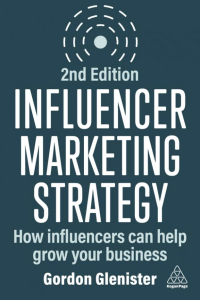 | Gordon Glenister: Hello, I am Gordon Glenister, the author of this month’s Bigeye Book Club selection: Influencer Marketing Strategy: How Influencers Can Help Grow Your Business. My book provides a comprehensive guide to implementing successful influencer marketing campaigns for both brands and individuals. I cover everything from working with celebrity endorsements to leveraging micro-influencers and explain how to navigate the rapidly evolving landscape of social media platforms. The book is packed with real-world case studies, practical advice and strategies for measuring campaign effectiveness. As an IN CLEAR FOCUS listener, you can save 25% on Influencer Marketing Strategy when you order directly from my publisher at KoganPage.com. Just enter the exclusive promo code BIGEYE25 at checkout. Shipping is always complimentary for customers in the US and the UK. I do hope my book helps you harness the power of influencer marketing to grow your brand, whether you’re a marketing professional, a business owner, or an aspiring influencer yourself. Thank you! |
Adrian Tennant: Welcome back. I’m talking with Greg Brooks, partner and CMO at SearchTides, about the future of SEO in the age of AI. Greg, can you explain the concept of value per word and why it’s becoming increasingly important in SEO?
Greg Brooks: Yeah. We just had a conversation about the old way of writing incentivized people to make encyclopedia pages and the old way of writing incentivized people to go longer and bigger. So, “Oh, this list is a top 10. I’m going to make a top 20.” It was called skyscraper content. And consumer behavior has shifted. We are used to shorter videos now. We want to get to the point of what we’re reading faster. If I can learn something in 10 seconds of reading or watching a video and you give me a two-minute segment, whether written or video, that’s brutal for me. I just lost a minute 50 seconds. So, value per word or value per second, if we’re talking about video, comes down to how efficient can we be at distilling the information that we need to someone. Now, that doesn’t actually mean automatically having something that’s shorter. It definitely means removing the fluff, which is going to be a habit that’s there for most people who have written content in the last five years. Pro hack: you can use ChatGPT, put in your article. and literally prompt it and say, “Can you identify and remove the fluff from this article?” And then you’ll be sad when two-thirds of it disappears, but you’ll be better off for it. So value per word, value per second is how do you make sure what you’re talking about is exactly what is needed and doesn’t get fluffier than that.
Adrian Tennant: Got it. Well, as you know, there’s been some debate about whether traditional SEO fundamentals like backlinks are still relevant. What’s your perspective on this?
Greg Brooks: Backlinks, ironically, the more people say that they’re unimportant, the more important they become. And this has basically been the case consistently over time, but we do a ton of link-building at SearchTides. It’s probably the number one result generator that we get compared to competition in the search results because it is so hard to do and manual to do. It’s brute force. And because that’s the case, people shy away from it and they want to do, you know, typically you’re talking about one or two or three internal SEOs and someone’s just going to spend their entire time, you know, building backlinks. That’s pretty rough for someone who is used to looking at onsite optimization and technical audits and things like that. It’s really a different skill set. So unless you’re structured in a way to do that as an SEO, you typically shy away from that. The irony in all of this is that Google’s algorithm is basically – depending on how you want to look at it – is either a triangle or a square of different components to it. And so links is one of them. Content is another one of them. Technical is another one of them. And then we create a fourth one with on-site, which is basically on-page optimization. So the more one of those becomes easier for more people to do, the less of an advantage there is. And the more something is more difficult, the more there is an advantage. What does an LLM do for content? It makes it easier for more people to create good content. What does that mean? That means that the pull from the other categories will become stronger. And if you look at the profile of a traditional SEO, they tend to be good at technical or they focus on content. And then on page is kind of like this thrown in that everyone thinks they’re good at. So those are the strengths of most brands, and now they’re basically doubling down on those with LLMs and with content creation tools. That is going to leave link building and links and backlink profiles as a stronger metric in the future. Which by the way, looking at the data that we look at today, backlink profile is the number one determinant of rankings for all national search terms. So if you throw out local, because that’s really heavily dependent on geography. Like if I’m in a car, I need a restaurant that’s really close to me. So as soon as you throw that out and you deal with national search terms, links is the number one ranking metric that we’re still seeing in our data.
Adrian Tennant: Fascinating. So what’s old is new again.
Greg Brooks: Yeah. Weird that it’s cyclical. That’s almost like life!
Adrian Tennant: So Greg, what advice would you give to marketers launching new consumer brands?
Greg Brooks: The most important thing for you is to figure out your paid social strategy. And the reason why that’s the case is because if you’re a new brand, that is typically going to allow you to recycle your cash flow faster than pretty much any other channel that you can do at the beginning. The next thing that I would do, or if you didn’t have the funds to do that, so if you’ve done that and now you’re building up your cash flow, or if you’re like, “I’m literally a new brand and I don’t have any money,” then I would be focusing on social search. And social search is free. It’s just your time to build up a social media presence. Most people are creating content because they want to make content. They’re not thinking about it from the perspective of how do I create content and treat the search bar on TikTok or YouTube exactly as I do with the search bar on Google? What are people searching for? What do they want to know? What do the search volumes look like? What’s being displayed there? What search results have poor content from modest accounts versus what search results have fantastic content from big accounts treated the exact same way? And basically build up your traffic through those channels.
Adrian Tennant: Excellent advice, thank you. What do you think will be the biggest challenges and opportunities in SEO over the next few years? I’m guessing AI might figure in some of those …
Greg Brooks: I think [by] doubling down on Google SEO, you’re going to look like a genius in a couple of years. So basically, if you look at the field of LLMs right now, you basically have ChatGPT, you have Perplexity, you have GPT 4.0 models, and then you have Google AI overviews on Google. You have the Bing equivalent on Bing, and then you have algorithmic search bars on social media. So that’s your LLM hub where people generate information from. I think that all social media websites over time increase a noise-to-signal ratio because basically you have platforms where individuals flourish and then they bring lots of friends and they get lots of people coming onto the platforms and then those companies are hemorrhaging money. So they’re like, “It’s time to turn on the monetization.” And then you have like ads really flowing in and integrating. And then you have the rise of a platform, the fall of a platform, and then you inevitably have like a new platform that comes on that’s simply at an earlier stage. So it doesn’t have that noise-to-signal ratio yet. Facebook was amazing. Then they had to make money. So they turned on the monetization engine and then people were like, “Wow, this is a lot of ads.” So what did they do? Then they went to Instagram because here’s this thing that’s amazing. It’s like just my friends all of a sudden. And then what happened? Then they turn on their monetization. And so what do people do? Then they went to TikTok and they were like, “Here’s this thing. It’s amazing.” And then what? So that will continue to happen. And so your big payoff in that is to get onto the new sites early and cement yourself from an organic perspective. So that’s cool. That’s, you know, that’s one way to do it. But in terms of where all of the AI search is going, the average search result that ChatGPT provides you when it doesn’t know the answer and it needs to look it up is the number 14 search result on Bing, which you would never get to if you were looking. I don’t even know what the second page of Bing looks like. I’ve never been there before. I have no idea, but this is the thing that’s actually being provided as the answer from an LLM. Why is that the case? Well, right now, over 90% of all major websites have blocked LLMs from crawling their websites because they want to be able to either sue them like New York Times did, or they want, you know, to get a big subscription or they don’t know what to do. So “We don’t know if this is a good idea, so we’re not going to do it.” The second issue with that is the LLMs can’t actually crawl the internet. So their data growth is capped at publicly accessible data sets or illegally obtained data sets. So the innovations that we’re seeing with like ChatGPT, they’re doing everything in their power to get more data sets. But the innovations that they’re making is basically improvements with the current data sets. That’s like how it’s growing and getting better. Ironically, Adrian, there is one LLM that will never ever be blocked by websites. In fact, those websites actively hope and seek and make sure that the robots and spiders can crawl their website, and that’s Google. Every single website wants Google to crawl and scrape their websites so they can show up in the search results. What does that mean for AI overviews, formerly Google SGE, basically the AI blurb at the top of the page? It means two things. Number one, Google has the entire internet to train its model on, whereas all the competitors have about 7% of the internet. And then if you take that sideways, you go, “Okay, well, what about unique training sources?” Google has YouTube to be able to train on in a video capacity that’s just not publicly available. So you basically have the one website that’s already crawling the internet and knows how to do that better than anybody else with now two of the best unique data sets that no one else can access. If I was betting, I would say that’s probably going to play out how it sounds like it’s going to play out. And a lot of the other stuff is going to leave its initial hype cycle. And I think we’re going to see that combined with the fact that you have trackability that exists on Google and stuff like Google Analytics, which marketing departments are obsessed with and C-suites are obsessed with. So all of that, to me, means Google isn’t necessarily going anywhere and it might actually improve its positioning compared to where it is today.
Adrian Tennant: Well, that’s a very contrarian view, if you don’t mind me saying so, Greg.
Greg Brooks: Yeah, thank you. I’d be scared if I got up here and started saying things that people agreed with, because that’s basically how we’ve been successful at SearchTides. We’re just like, “How far out can we look and how can we obtain that perspective objectively?” And then we just try to bring that into the present. So SearchTides is absolutely offering social search. We believe for different demographics and stuff, it’s important to be on these websites. And we believe there’s people. I’m on YouTube. That’s what makes me a Boomer, as opposed to being on these younger folks’ social media sites. So I totally get it. And I think different formats will be interesting. But I think in general, we have the ability to overreact to things, especially when people are incentivized to do that or incentivized to underreact to things. But typically the truth is somewhere in between.
Adrian Tennant: I’ve heard you observe elsewhere that AI is leading to more companies with just one to five people. How is this changing the competitive landscape in digital marketing?
Greg Brooks: This is fantastic. So let’s look at content as literally content. It used to be three television stations and 13, then 50, then 500 channels. And now there’s literally millions and millions across all the different social media websites. Technology was the trigger for that to expand the way that it did, because I used to need a television station and studio, and now I just need my phone. That’s it. So my prediction is that we’re going to see something similar with companies. The more AI progresses, the fewer people will be required to start a company. Similarly, companies won’t grow at the same person rate or headcount rate that they used to. We had layoffs a year ago. two years ago even, and those jobs are not coming back at the same rate that they used to because companies are expecting more production per each person based off of AI. That trend will basically continue, so you’re going to have one to five people companies that used to take five to 30 people to start. And that is going to create more competition in the marketplace. And I think they’ll basically have a split into people who don’t want to do research and they will go to the biggest options available. They say, “I don’t want to think just I know I’m going to get good enough here.” And if you’ve ever seen Idiocracy, that’s the Costco at Idiocracy, where it’s just everything. So we will have that as big as government will let it be. And then on the other end, you’re going to have more consumers doing more research and more personalized results via AI. So companies will have to declare who they are, what they care about, what their focus is, and that will match more closely with the customer.
Adrian Tennant: The conclusion being that actually AI creates more consumer choice.
Greg Brooks: Yes, 100%. It creates more consumer choice. And I think you’re going to see a lot more companies that are actually one person making like $50,000 a year or $70,000 a year or something like that, or two people making $100,000 a year. And those two people used to work at larger companies and now they just don’t anymore. And I think you’re going to see a lot of that in the marketplace. And I think you’re going to see basically that value will be extracted from larger companies because that’s who consumers will choose. And it’s going to get hard. It will become more difficult to acquire a customer. It will require more effort from the company’s perspective. Longer periods of trust-building will be required. And that’s why all of these things that we talk about become central. It’s about when someone is looking, are you there? And can you then keep someone in your ecosystem or your sphere until someone feels comfortable enough with you to make a purchase?
Adrian Tennant: I promise the listeners fresh perspectives. You’ve definitely delivered on that, Greg.
Greg Brooks: Thank you.
Adrian Tennant: Great conversation. How can our listeners learn more about you and your work at SearchTides or connect with you online?
Greg Brooks: So yeah, SearchTides.com. If you go there, you’ll notice that there’s some pretty cool, new, exciting things happening from us. You can sign up for our newsletter. You can follow us on social media. We’re @SearchTides on YouTube or @SearchTides on LinkedIn. I’m on LinkedIn personally, Gregory B. Brooks. You can follow me or friend request me on there. And we talk about this sort of stuff all the time. And it’s fun and it’s entertaining. And at the same time, we think it’s really, really important and will dictate the next 10 or 15 years of commerce.
Adrian Tennant: Greg, thank you very much for sharing your insights on IN CLEAR FOCUS.
Greg Brooks: Thanks, Adrian, for having me on. Pleasure chatting.
Adrian Tennant: Thanks again to my guest this week, Greg Brooks, Partner and CMO at SearchTides. As always, you’ll find a complete transcript with links to the resources we discussed on the IN CLEAR FOCUS page at Bigeyeagency.com. Just select ‘Insights’ from the menu. If you enjoyed this episode, please follow us wherever you listen to podcasts and consider leaving a rating on Spotify or a review on Apple Podcasts. Thank you for listening to IN CLEAR FOCUS, produced by Bigeye. I’ve been your host, Adrian Tennant. Until next week, goodbye.
TIMESTAMPS
00:00 – Introduction to SEO and AI Transformation
02:09 – Greg Brooks’ Background and Role at SearchTides
03:52 – Overview of SearchTides and Clientele
04:24 – AI’s Impact on Content Creation and SEO
06:01 – Importance of Discoverability on Social Platforms
00:09:55 – Challenges and Opportunities in E-commerce SEO for CPG Brands
12:08 – Importance of Experience and Expertise in Content Creation
14:44 – Bigeye Book Club Promotion
15:52 – Value per Word in SEO
17:38 – Relevance of Backlinks in SEO
20:40 – Advice for Launching New Consumer Brands
22:05 – Future Challenges and Opportunities in SEO
27:39 – Impact of AI on Company Sizes and Consumer Choice
30:41 – Conclusion and How to Connect with Greg Brooks
